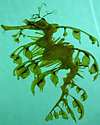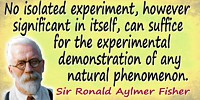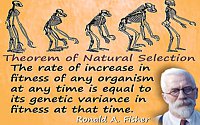 (source)
(source)
|
Sir Ronald Aylmer Fisher
(17 Feb 1890 - 29 Jul 1962)
British statistician, geneticist and evolutionary biologist who contributed to mathematical statistics, but also initiated biometric genetics and investigated dominance, backed up with practical breeding experiments. He published his fundamental theorem of natural selection in 1918.
|
Ronald Aylmer Fisher
“Natural selection is a mechanism for…improbability.”
Illustrated Quote - Medium (500 x 250 px)
More Ronald Aylmer Fisher quotes on science >>
Although this is well-known, and seen as a quote which various sources ascribe to Ronald Fisher, these words were actually written by Julian Huxley, to summarize Fisher's idea made in longer quote. Both forms appear in the book Evolution as a Process (1954) which Huxley co-edited. The shorter version was provided by Huxley early in the book to introduce Huxley's concept. It appears in full, later in the book, in the essay by Fisher, “Retrospect of the Criticisms of the Theory of Natural Selection.” The shorter quote is clearly not verbatim, but in Huxley’s words, when compared with the statement as it was actually written by Fisher:
“It was Darwin’s chief contribution, not only to Biology but to the whole of natural science, to have brought to light a process by which contingencies a priori improbable are given, in the process of time, an increasing probability, until it is their non-occurrence, rather than their occurrence, which becomes highly improbable.”
The essay itself is written to look back at what Fisher identifies as historically four successive “comparatively distinct periods” when “objections and difficulties in respect of Darwin’s views” were aired. Fisher considers these periods to be:
(a) “the difficulties which he himself felt during the period the theory was developing in his mind”, (b) objections from scientific friends discussed “as difficulties of the theory in the sixth chapter of the Origin”, (c) the reactions expressed in the essays of “the more conservative or recalcitrant biologists … to the growing acceptance of Darwin’s views” and (d) when the early geneticists widely disseminated the assumption “that the discovery of Mendel’s laws of inheritance was unfavorable, or even fatal, to the theory of natural selection.”
Midway through his essay, Fisher addresses one of these difficulties “with respect to organs of extreme perfection, of which Darwin chooses the eye as an example.” Darwin recognized that this only became a difficulty to understand if imagination is too limited. Quoting Darwin from chapter 6 of the Origin:
“Reason tells me, that if numerous gradations from a simple and imperfect eye to one complex and perfect can be shown to exist, each grade being useful to its possessor, as is certainly the case; if further, the eye ever varies and the variations be inherited, as is likewise certainly the case; and if such variations should be useful to any animal under changing conditions of life, then the difficulty of believing that a perfect and complex eye could be formed by natural selection, though insuperable by our imagination, should not be considered as subversive of the theory.”
The subject quote (given at the top) by Fisher is part of his remarks to expand on the idea, which in the essay followed the Darwin quote.
- Science Quotes by Sir Ronald Aylmer Fisher.
- 17 Feb - short biography, births, deaths and events on date of Fisher's birth.
- Ronald Aylmer Fisher - context of quote “Fundamental Theorem of Natural Selection” - Medium image (500 x 350 px)
- Ronald Aylmer Fisher - context of quote “Fundamental Theorem of Natural Selection” - Large image (800 x 600 px)
- Ronald Aylmer Fisher - context of quote “Natural selection is a mechanism for…improbability.” - Large image (800 x 400 px)
- Ronald Aylmer Fisher - context of quote “Inductive inference … [for] new knowledge.” - Medium image (500 x 250 px)
- Ronald Aylmer Fisher - context of quote “Inductive inference … [for] new knowledge.” - Large image (800 x 400 px)
- Ronald Aylmer Fisher - context of quote “No isolated experiment can suffice” - Medium image (500 x 250 px)
- Ronald Aylmer Fisher - context of quote “No isolated experiment can suffice” - Large image (800 x 400 px)
- Statistical Methods, Experimental Design, and Scientific Inference, by Ronald A. Fisher. - book suggestion.


![Ronald Aylmer Fisher quote Inductive inference … [for] new knowledge.](https://todayinsci.com/F/Fisher_Ronald/FisherRonald-InferenceThm.jpg)






